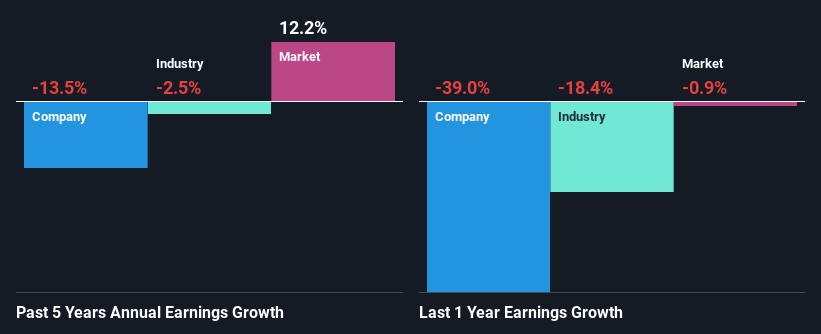- United Kingdom
- /
- Chemicals
- /
- LSE:JMAT
Johnson Matthey Plc's (LON:JMAT) On An Uptrend But Financial Prospects Look Pretty Weak: Is The Stock Overpriced?
Most readers would already be aware that Johnson Matthey's (LON:JMAT) stock increased significantly by 13% over the past three months. We, however wanted to have a closer look at its key financial indicators as the markets usually pay for long-term fundamentals, and in this case, they don't look very promising. Particularly, we will be paying attention to Johnson Matthey's ROE today.
Return on equity or ROE is a key measure used to assess how efficiently a company's management is utilizing the company's capital. Simply put, it is used to assess the profitability of a company in relation to its equity capital.
View our latest analysis for Johnson Matthey
How To Calculate Return On Equity?
The formula for return on equity is:
Return on Equity = Net Profit (from continuing operations) ÷ Shareholders' Equity
So, based on the above formula, the ROE for Johnson Matthey is:
7.3% = UK£177m ÷ UK£2.4b (Based on the trailing twelve months to September 2023).
The 'return' is the income the business earned over the last year. So, this means that for every £1 of its shareholder's investments, the company generates a profit of £0.07.
What Has ROE Got To Do With Earnings Growth?
Thus far, we have learned that ROE measures how efficiently a company is generating its profits. Based on how much of its profits the company chooses to reinvest or "retain", we are then able to evaluate a company's future ability to generate profits. Assuming all else is equal, companies that have both a higher return on equity and higher profit retention are usually the ones that have a higher growth rate when compared to companies that don't have the same features.
Johnson Matthey's Earnings Growth And 7.3% ROE
On the face of it, Johnson Matthey's ROE is not much to talk about. However, its ROE is similar to the industry average of 7.6%, so we won't completely dismiss the company. But then again, Johnson Matthey's five year net income shrunk at a rate of 14%. Remember, the company's ROE is a bit low to begin with. Therefore, the decline in earnings could also be the result of this.
Furthermore, even when compared to the industry, which has been shrinking its earnings at a rate of 2.5% over the last few years, we found that Johnson Matthey's performance is pretty disappointing, as it suggests that the company has been shrunk its earnings at a rate faster than the industry.

Earnings growth is a huge factor in stock valuation. It’s important for an investor to know whether the market has priced in the company's expected earnings growth (or decline). This then helps them determine if the stock is placed for a bright or bleak future. What is JMAT worth today? The intrinsic value infographic in our free research report helps visualize whether JMAT is currently mispriced by the market.
Is Johnson Matthey Efficiently Re-investing Its Profits?
With a high three-year median payout ratio of 74% (implying that 26% of the profits are retained), most of Johnson Matthey's profits are being paid to shareholders, which explains the company's shrinking earnings. With only very little left to reinvest into the business, growth in earnings is far from likely. To know the 4 risks we have identified for Johnson Matthey visit our risks dashboard for free.
Additionally, Johnson Matthey has paid dividends over a period of at least ten years, which means that the company's management is determined to pay dividends even if it means little to no earnings growth. Existing analyst estimates suggest that the company's future payout ratio is expected to drop to 43% over the next three years. The fact that the company's ROE is expected to rise to 12% over the same period is explained by the drop in the payout ratio.
Summary
On the whole, Johnson Matthey's performance is quite a big let-down. The company has seen a lack of earnings growth as a result of retaining very little profits and whatever little it does retain, is being reinvested at a very low rate of return. That being so, the latest industry analyst forecasts show that the analysts are expecting to see a huge improvement in the company's earnings growth rate. To know more about the company's future earnings growth forecasts take a look at this free report on analyst forecasts for the company to find out more.
New: Manage All Your Stock Portfolios in One Place
We've created the ultimate portfolio companion for stock investors, and it's free.
• Connect an unlimited number of Portfolios and see your total in one currency
• Be alerted to new Warning Signs or Risks via email or mobile
• Track the Fair Value of your stocks
Have feedback on this article? Concerned about the content? Get in touch with us directly. Alternatively, email editorial-team (at) simplywallst.com.
This article by Simply Wall St is general in nature. We provide commentary based on historical data and analyst forecasts only using an unbiased methodology and our articles are not intended to be financial advice. It does not constitute a recommendation to buy or sell any stock, and does not take account of your objectives, or your financial situation. We aim to bring you long-term focused analysis driven by fundamental data. Note that our analysis may not factor in the latest price-sensitive company announcements or qualitative material. Simply Wall St has no position in any stocks mentioned.
About LSE:JMAT
Johnson Matthey
Engages in the clean air, catalyst and hydrogen technology, and platinum group metals (PGM) service businesses in the United Kingdom, Germany, rest of Europe, the United States, rest of North America, China, rest of Asia, and internationally.
Undervalued with excellent balance sheet.
Similar Companies
Market Insights
Community Narratives



